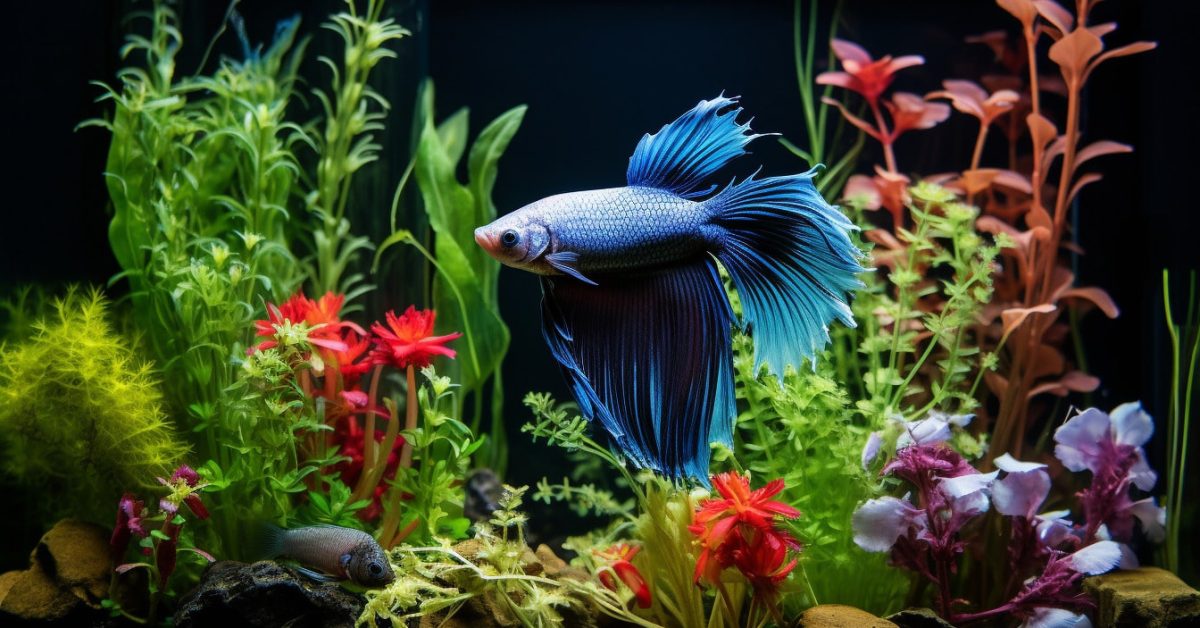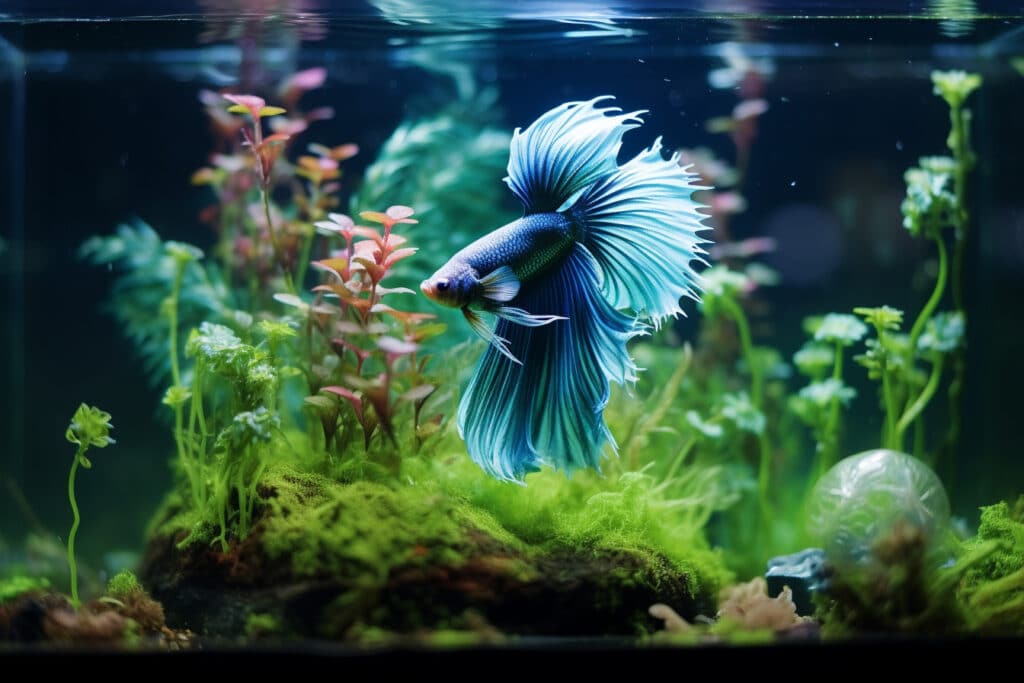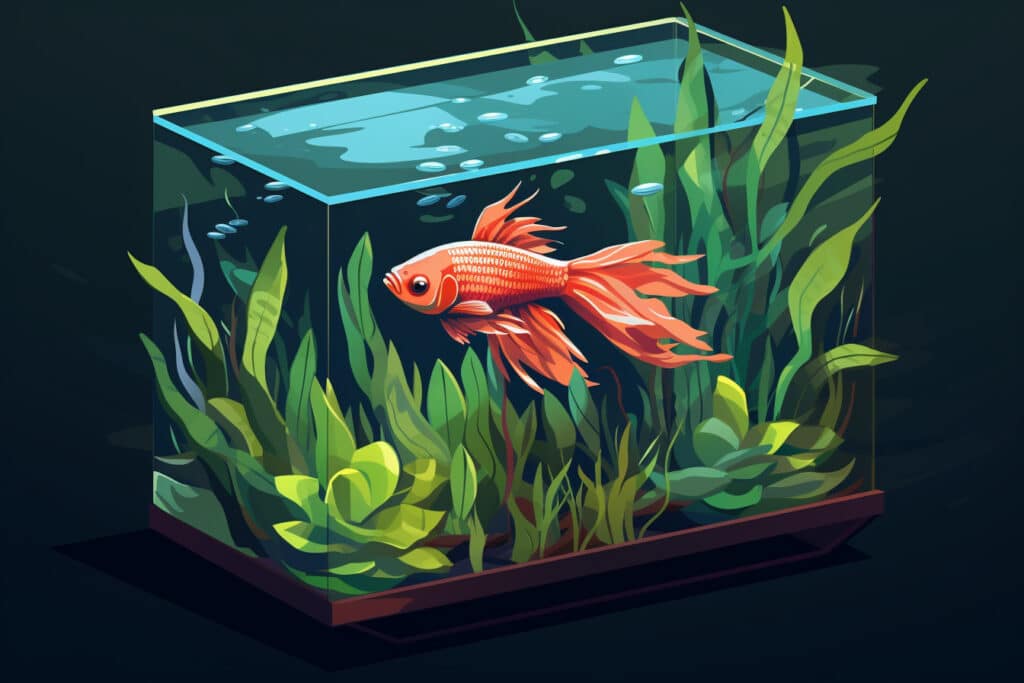How Long Do Betta Fish Live in Wild and Captivity?
In this blog post, we will learn how long betta fish live and how you can make your new Tropical friend stick around for a long and happy life. Come in to find out.

Dive into the captivating lifespan of betta fish with our comprehensive guide. Discover key factors influencing their longevity, from typical lifespan expectations to vital care tips, learn about the factors that influence their health, and how to create the perfect environment for your Betta to thrive.
Table of Contents 🦑
How Long Do Betta Fish Live in The Wild?
Betta fish, famously known as Siamese fighting fish, were discovered centuries ago and hail from Southeast Asia. Originating from the tranquil, slow-flowing waters of Thailand, Cambodia, Laos, and Vietnam, these fish are adapted to thrive in shallow environments rich in biodiversity
In the wild, Betta fish typically have a shorter lifespan compared to those in captivity, mainly due to environmental factors and predation. Wild Betta fish, on average, live for about 2 to 5 years. This lifespan is influenced by the challenges they face in their natural habitat, which include fluctuations in water conditions, food availability, and threats from predators.
Hunting Skills
Betta fish In the wild is a predator, Betta has some nice moves and impressive hunting skills which help to keep the betta’s lifespan much longer.
The betta has a varied and interesting diet that consists mainly of small insects, larvae, and crustaceans. These fish are opportunistic feeders, which means they will eat whatever prey they can find. Some of the most common food sources for wild bettas include mosquito larvae, water fleas, brine shrimp, and bloodworms.
Betta fish have a labyrinth organ, which means they can breathe air from the surface, allowing them to eat insects that land on the water’s surface. This organ also helps them survive in low-oxygen environments, such as shallow puddles or rice paddies. In the wild, bettas are constantly on the hunt for food, which keeps them active and stimulated.
betta fish are fascinating creatures and with the right environment, diet, and some luck these beautiful fish can thrive in nature and live full fish lives.
Betta's Natural Predators
In the wild, betta fish have several natural predators that they must constantly watch out for. These predators can range from larger fish to birds and even other aquatic animals.
Some common predators of betta fish include larger fish such as catfish, cichlids, and other predatory species of fish. Additionally, birds such as kingfishers and herons have been known to prey on betta fish in the wild.
Other aquatic animals that may prey on betta fish include snakes and turtles. Even larger insects, such as water beetles, may pose a threat to young betta fish.
The Art of Fish Defense.
Betta fish are fascinating creatures with incredible defense mechanisms that help them survive in the wild and live longer lives. Their ability to defend themselves is vital to their survival, and they have a range of defense skills that enable them to do so.
One of their most prominent defense mechanisms is their aggressive behavior, which serves as their first line of defense against predators and competitors. With sharp teeth and powerful jaws, they are formidable opponents.
They are also quick swimmers and can dart away from potential threats in a blink of an eye. Furthermore, their bright colors and large fins may act as a warning to predators that they are toxic or unappetizing. These various defense mechanisms contribute to the betta fish’s ability to thrive in the wild and have a longer lifespan.
Additionally, One of their most impressive skills is their ability to communicate and intimidate through their colorful long fins. When they feel threatened, they can flare their fins and gills to make themselves look bigger and more formidable. But their fins also serve another purpose, which is to help them blend into their surroundings, camouflage themself, and avoid predators.
As a last resort, betta fish can jump out of the water thanks to their unique labyrinth organ that allows them to breathe air and survive temporarily out of the water. These amazing abilities contribute to the long lifespan of Siamese fighting fish in the wild.
All in all, it’s impressive how these little fish can use a combination of tactics to stay safe and protect themselves from danger. Whether they are using their aggressive behavior, colorful fins, camouflage, or jumping ability, betta fish are not to be underestimated!”.

How Long do Betta Fish Live in Captivity?
Betta fish are one of the most popular choices for fish enthusiasts as pets. If you’re thinking of bringing a betta fish home, you may be curious about how long it can live under your care.
On average, a healthy Betta fish can live for 2 to 5 years, but some have been known to live up to 7 years or more. To ensure a long betta fish lifespan in captivity, it’s essential to provide them with a clean and spacious tank, a varied and balanced diet, and regular water changes.
Various factors can influence the lifespan of betta fish, such as the quality of their environment, the type of diet they receive, and the overall fish care they receive from their owners.
Betta fish can make great pets for fish enthusiasts, but it’s important to keep in mind that their lifespan can vary depending on how well they are taken care of. The good news is that with proper care and attention, betta fish can live a long and healthy life in captivity.
By taking these steps, you can help your betta fish thrive and enjoy their company for many years to come.
High-Quality Betta Food
Providing high-quality food is crucial for ensuring a long lifespan for your betta fish. A well-balanced diet that caters to their carnivorous nature is essential.
High-quality betta food typically includes protein-rich pellets or flakes specifically formulated for bettas, containing all the necessary nutrients for their health and vitality. Additionally, incorporating variety in their diet with live or frozen foods such as bloodworms, brine shrimp, and daphnia can greatly benefit their well-being. These not only satisfy their natural hunting instincts but also provide essential proteins and nutrients.
Regular feeding with appropriate portion sizes is key to preventing health issues like obesity while promoting a strong immune system, vibrant coloration, and overall longevity. Choosing the right food and feeding regimen plays a pivotal role in ensuring your betta fish lives a full, healthy life
Tank Size
If you want to provide the best possible environment for your betta fish, then tank size is a crucial factor to consider. To ensure the health and happiness of your fish, it’s important to give them enough space to swim around and explore.
Ideally, a betta fish should have a tank that can hold at least a minimum of 5 gallons of water, 10 gallons is even better. Although it may be tempting to keep your fish in a smaller tank or a fish bowl, it’s not recommended as it can lead to health problems and a shorter lifespan.
By investing in a larger tank, you’ll be creating a more stable and healthy environment for your beloved pet.
Water Temperature
Betta fish are native to the warm waters of Southeast Asia, so they require a consistent and warm environment in their tanks to thrive.
The recommended temperature range for betta fish is between 76°F and 82°F (24°C to 28°C), which is higher than the standard room temperature in many homes.
Keeping the water temperature within this range helps ensure that your betta fish remains healthy and active. You can use a Heater to maintain a stable warm temperature and keep your betta fish happy.
Water Quality
Keeping your betta fish’s tank water clean and healthy is key to ensuring their overall well-being and longevity. Bettas thrive in clean, well-maintained water with stable parameters.
The ideal water conditions include:
-
- pH level between 6.5 and 7.5.
- Regular water changes, typically 25-50% per week, are crucial to remove toxins such as ammonia, nitrite, and nitrate, which can accumulate in the tank and harm your betta.
- Using a gentle filtration system helps keep the water clean without creating strong currents that can stress the betta.
- The use of water conditioners to remove chlorine and chloramines from tap water is also essential.
- pH level between 6.5 and 7.5.
The quality of water in your betta fish’s tank can impact their health and lead to various illnesses such as fin rot, swim bladder issues, and fungal infections. By diligently monitoring and managing water quality, you can create a stable and stress-free environment that significantly contributes to the longevity and well-being of your betta fish
The Importance of Oxygen
Betta fish are beloved pets, and as their owners, we want them to live long and healthy lives. To achieve this, we must pay close attention to the conditions in their tank.
One essential aspect of maintaining optimal health for betta fish is ensuring that the water is adequately oxygenated. Oxygen is vital for betta fish, and low levels of oxygen in the water can lead to stress, illness, and a shortened lifespan.
One way to ensure your betta fish have enough oxygen is by using an air stone. These accessories help increase the water’s surface agitation, allowing more oxygen to dissolve into the water.
Live plants are also a great way to increase the oxygen levels in the tank, They also providing a beautiful and natural environment and some hiding spots for your betta.

Inconclusion
The answer to the question of ” How long do betta fish live “ is very dependent on how we will take care of our pet betta fish friend.
To help our pet betta fish live longer we need to provide the proper fish care and environment. This includes maintaining a steady warm temperature, ensuring good water quality, offering high-quality food, and keeping the water oxygenated.
By following these guidelines, you can rest assured that your betta fish will be thriving and live a long and happy life and be a part of your family for many years to come.

Delighted to have you here at BettaReef! This place is a treasure trove of knowledge about Betta fish, Betta Care, Health, Gear, and much more from the wonders of aquatic life. My journey in this fascinating world began when I was just 8, and now, as a seasoned hobbyist, I’m here to help fellow Betta enthusiasts create a thriving Betta environment for a healthy life.
I’m committed to delivering high-quality content, backed by a stringent editorial process. Each product review is based on real-life usage and practical analysis, ensuring that you get insights and advice that truly matter.
Related Blog Posts:

How Long Can Betta Fish Go Without Food?
Swim To 🤿 Home How Long Can Betta Fish Go Without Food? In the bustling

How Big Do Betta Fish Get
Home How Big Do Betta Fish Get? So, How Big Do Betta Fish Get?, Welcome

21 Most Beautiful Types of Betta Fish
Swim To 🤿 Home 21 Most Beautiful Types of Betta Fish Betta fish or Siamese
